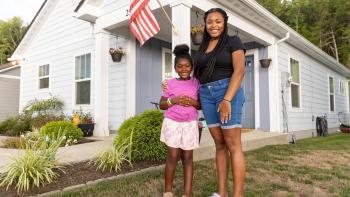
Reflecting on the first year of our Cost of Home campaign
We first launched Cost of Home, Habitat for Humanity’s first U.S. advocacy campaign in June 2019.
The world has changed since then; the significant impacts of the COVID-19 pandemic and its economic fallout are still unfolding. The number of families struggling to make ends meet continues to grow.
Cost of Home has been a critical component of our response to the pandemic and will continue to play a key role in recovery. Habitat is refocusing and expanding its advocacy efforts, through Cost of Home, to address the housing affordability challenges that have been further revealed and exacerbated as a result of COVID-19.
Even further, the killing of George Floyd and protests in response have highlighted the ongoing impacts of systemic racism, which have been a reality for black communities for centuries. Guiding the policy work of the campaign, the Cost of Home Policy Platform states, “Advocates and policymakers must acknowledge and address the well-documented historic patterns of racial discrimination in housing and land use policies — at all levels of government — that still impact the makeup and opportunities of our communities.” Moving forward, we must recommit ourselves to taking bold actions to ensure racial equity. Our collective advocacy through the Cost of Home campaign gives us a solid platform and a critical tool for us as we move forward.
Habitat’s strategic plan calls on us to build sector impact through policies and systems that advance access to adequate, affordable housing. Working locally, Habitat affiliates across the nation see firsthand that a stable, affordable home is out of reach for far too many. Even before the pandemic, more than 38 million U.S. families were spending too much on their housing. We know we can’t meet the need through building homes alone. That’s why it’s imperative that we address the underlying policies and systems that hinder access to housing.
We built a five-year campaign to mobilize local Habitat organizations, partners, volunteers and community members across the country to find solutions and help create policies that will allow 10 million individuals to have access to affordable homes. In just one year, more than 300 Habitat organizations from 45 states and Washington, D.C., are working in partnership with local communities, coalitions and policymakers to influence policies to improve home affordability. Already, significant progress has been made — from improving the supply and preservation of affordable homes in Buncombe County, North Carolina, to optimizing land use for affordable homes in Austin, Texas, to increasing access to credit in Oregon to expanding access to and developing communities of opportunity in Omaha, Nebraska.
Looking ahead, we know the impacts of COVID-19 will be felt most by those who can afford it the least. We know the disparate impact the pandemic will have on communities of color, communities already suffering as a result of systemic racism that has all too often played out in housing policy. We know we need to make home affordability a priority in this year’s elections. We know we must continue to advocate to policymakers at all levels of government to ensure that every family — no matter who they are, where they live or how much money they earn — can build the foundation for a stable, healthy future for themselves and their families.
Now more than ever, we must work together to make the cost of home something we all can afford.

